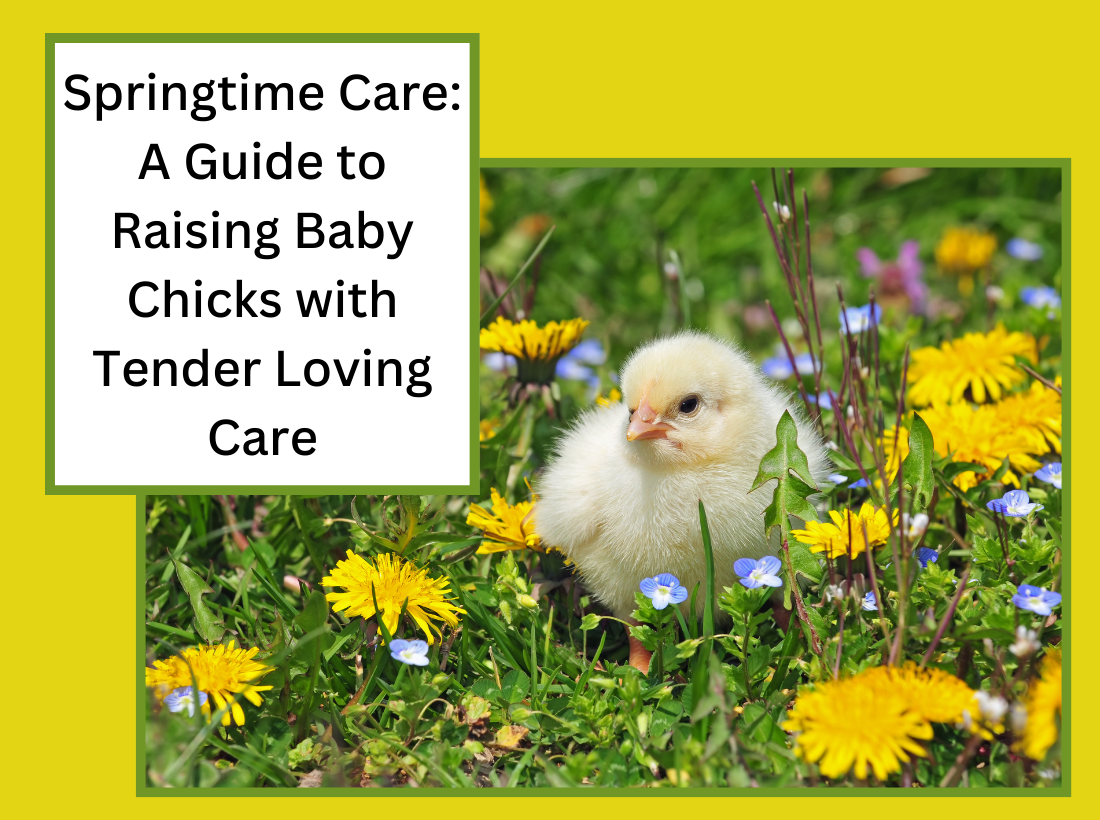
Spring is a time of renewal, and for many backyard enthusiasts, it’s also the season for welcoming new additions to the flock – baby chicks! Raising chicks can be an incredibly rewarding experience, but it requires careful attention and nurturing to ensure they grow into healthy and happy chickens. Whether you’re a seasoned poultry keeper or a newbie to the world of raising chickens, this guide will provide you with essential tips and insights to care for baby chickens during the springtime months.
1. Provide a Warm and Cozy Brooder:
As soon as your baby chicks hatch or arrive, they’ll need a warm and secure environment to thrive. Set up a brooder—a safe, enclosed space—equipped with a heat lamp or brooder plate to maintain a temperature of around 95°F (35°C) for the first week. Gradually reduce the temperature by 5°F (2-3°C) each week until they’re fully feathered, typically around 6-8 weeks of age.
2. Ensure Proper Nutrition:
Nutrition is crucial for the healthy development of baby chicks. Start them off with a high-quality chick starter feed containing around 18-20% protein. Provide fresh, clean water at all times, preferably in a shallow dish to prevent drowning. You can also offer treats like finely chopped greens or mealworms in moderation to supplement their diet and provide enrichment.
3. Maintain Clean Bedding:
Cleanliness is essential to prevent disease and keep your baby chicks comfortable. Use absorbent bedding materials such as pine shavings or straw in the brooder and change it regularly to keep it dry and odor-free. Avoid using cedar shavings, as they can be toxic to chicks.
4. Monitor Health and Behavior:
Keep a close eye on your baby chicks’ health and behavior to catch any signs of illness or distress early on. Healthy chicks should be active, alert, and peeping contentedly. Watch for symptoms such as lethargy, labored breathing, or abnormal droppings, and consult a veterinarian if you have any concerns.
5. Provide Adequate Space:
As your chicks grow, they’ll need more space to stretch their wings and exercise. Gradually increase the size of their brooder or move them to a larger enclosure such as a chicken coop or run equipped with a heat source for colder nights. Aim for a minimum of 2-3 square feet per chick indoors and at least 10 square feet per bird outdoors.
6. Introduce Outdoor Time:
When the weather is mild and your chicks are fully feathered, introduce them to the great outdoors for supervised outdoor playtime. Start with short outings in a protected area free from predators, gradually increasing the duration as they become more accustomed to their surroundings. Provide plenty of shade, fresh water, and access to shelter in case they need to retreat.
7. Socialize and Handle Gently:
Chicks are naturally curious and social creatures, so spend time interacting with them to build trust and familiarity. Gently handle your chicks from a young age to help them become tame and accustomed to human contact. Avoid excessive handling or rough treatment, as this can cause stress and injury.
8. Protect from Predators:
Predators pose a significant threat to baby chicks, so take steps to safeguard them from harm. Ensure their enclosure is securely fenced and predator-proofed, with hardware cloth buried around the perimeter to deter digging predators. Use predator-proof locks on coop doors and consider installing motion-activated lights or alarms for added protection.
9. Gradually Transition to Adult Feeding and Housing:
As your chicks grow, gradually transition them to an adult chicken feed formulated for layers or meat birds, depending on your goals. Introduce them to their permanent housing setup, whether it’s a chicken coop, tractor, or free-range arrangement, ensuring they have adequate space, ventilation, and protection from the elements.
10. Enjoy the Journey:
Raising baby chicks is a journey filled with joy, challenges, and countless rewarding moments. Embrace the experience, learn from each stage of growth, and enjoy watching your fluffy chicks transform into thriving chickens. With proper care, love, and attention, your springtime chicks will become valued members of your flock for years to come.
Conclusion:
Raising baby chicks in spring is a delightful and fulfilling endeavor that offers endless opportunities for learning and connection with nature. By providing a warm, nurturing environment, ensuring proper nutrition and healthcare, and gradually introducing them to the great outdoors, you’ll set your chicks up for a healthy and happy life. So roll up your sleeves, gather your supplies, and embark on this exciting journey of raising baby chicks with tender loving care.
